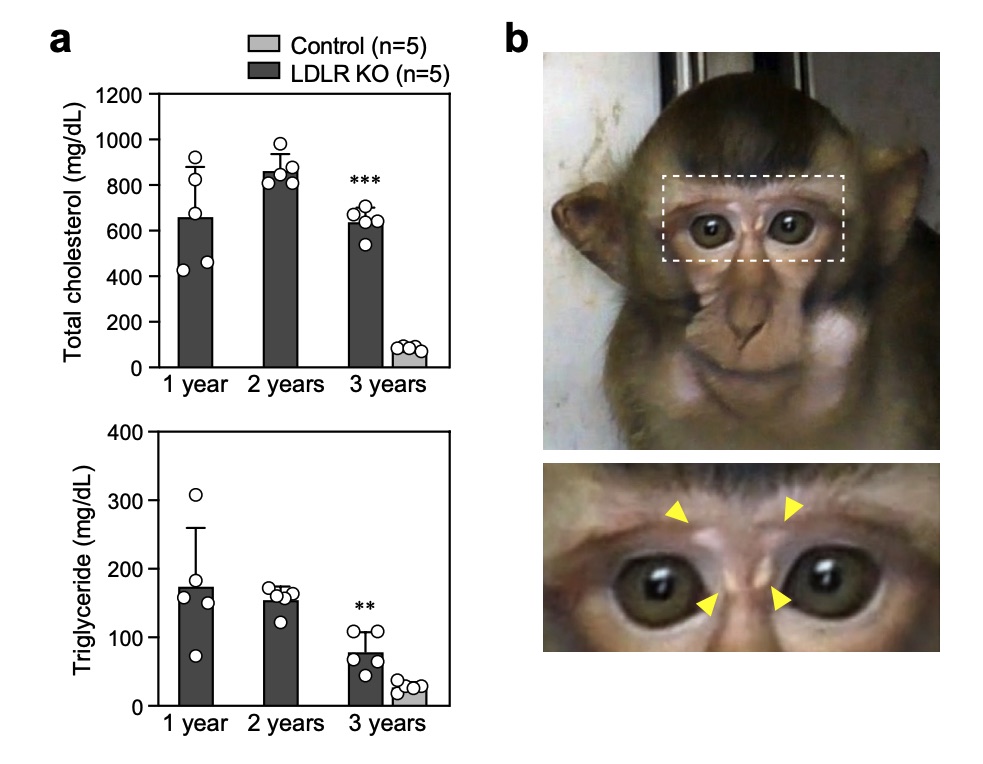Primate Dyslipidemia Modeling & Pharmacodynamics Service
Creative Biolabs is recognized as a trusty CRO partner by our global clients. With the fully-equipped facilities, a professional R&D team, and the standardization management system, we have assisted our global clients in their preclinical drug efficacy evaluation projects using our well-established non-human primate (NHP) disease models (please click here to find more information) and greatly advanced their preclinical non-GLP projects on our pharmacology and pharmacodynamics (PD/PK) platform.
What is Dyslipidemia?
Dyslipidemia, an abnormality of lipoprotein metabolism, is a metabolic disorder disease. It mainly includes elevated total cholesterol and low-density lipoprotein cholesterol, elevated triglycerides, and/or decreased high-density lipoprotein cholesterol. Dyslipidemia is not only an important factor leading to atherosclerosis (AS) but also an independent risk factor for coronary heart disease and ischemic stroke. Except for a few secondary dyslipidemias caused by systemic diseases, most of the dyslipidemias are primary dyslipidemias caused by genetic defects or interactions with environmental factors.
 Fig. 1 (a) Total cholesterol and triglyceride concentrations in the plasma isolated from control monkeys at 3 years old and LDLR KO monkeys at 1, 2, and 3 years old. (b) Representative photographs showing face of the LDLR KO monkey. Yellow arrows indicate periocular xanthoma.1
Fig. 1 (a) Total cholesterol and triglyceride concentrations in the plasma isolated from control monkeys at 3 years old and LDLR KO monkeys at 1, 2, and 3 years old. (b) Representative photographs showing face of the LDLR KO monkey. Yellow arrows indicate periocular xanthoma.1
Preclinical Tools for Dyslipidemia Research
The key role of dyslipidemia in causing death from cardiovascular disease has been repeatedly proven, but the underlying molecular mechanism is still controversial. In order to clarify the mechanism of action and evaluate the efficacy of potential drugs, preclinical animal models of dyslipidemia are considered useful tools. A high-cholesterol diet has been used to establish dyslipidemia models in rabbits, hamsters, and pigs that are sensitive to cholesterol. However, for species that are not sensitive to cholesterol, such as dogs, rats, and mice, bile acids and/or toxic influence of the thyroid gland need to be used for modeling. Genetic manipulation in rodents is also used for dyslipidemia model establishment.
Why We Need NHP Model of Dyslipidemia?
For many years, people adopt rats or mice to establish the model of hyperlipidemia. However, the synthesis of endogenous cholesterol in rats and mice is quite different from that of humans, and the plasma clearance rate of cholesterol is significantly higher than that of humans. Therefore, the extrapolation of experimental results of these rodent models to the human body is limited. NHPs are similar to humans in terms of cholesterol synthesis and metabolism, as well as the ratio of receptors to receptor transport pathways. Besides, NHPs' response to food lipids and blood lipid-regulating functional components is closer to humans. Therefore, more and more international researchers choose NHPs to establish the hyperlipidemia model.
What Services Can We Provide?
With many years of service in providing NHP disease models, Creative Biolabs has accumulated much experience in the establishment, optimization, and utilization of NHP disease models. We not only provide the well-established dyslipidemia model in NHPs, but also the related analysis services including blood biochemistry, fecal total bile acid levels measurement, lipid levels in the feces measurement, apoB, apoAI, LDL, and HDL levels determination (by SDS-PAGE, LC/MS), plasma concentrations of EPA and DPA, Omega-3 index analysis, etc. to advance your preclinical study projects.
If you are interested in the dyslipidemia model in NHPs, please feel free to contact us for more information. The professional R&D team of Creative Biolabs is willing to work with you and assist you in achieving your research goal.
Creative Biolabs offers various Metabolic Disorder Models you may be interested in:
| Metabolic Disorder Models | |
| Type I Diabetes Model | Type II Diabetes Model |
| Diet-Induced Obesity (DIO) Model | Primate Spontaneous Obesity Model |
| Primate Dyslipidemia Model | |
Reference
- Sato, Akira, et al. "Generation of a familial hypercholesterolemia model in non-human primate." Scientific Reports 13.1 (2023): 15649. Distributed under Open Access license CC BY 4.0, without modification.
For Research Use Only.
